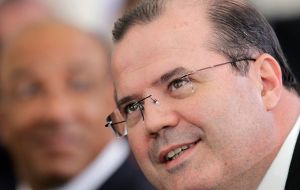MercoPress. South Atlantic News Agency
Brazil cuts basic rate to 10.5% and signals further reductions in the future
 Central bank president Tombini promises “moderate adjustments” to shield Brazil from the world crisis
Central bank president Tombini promises “moderate adjustments” to shield Brazil from the world crisis Brazil’s central bank indicated on Wednesday it will keep cutting interest rates at the current pace after it reduced borrowing costs by a half-point to 10.5%, for a fourth straight meeting.
The bank’s board, led by President Alexandre Tombini, voted unanimously to reduce the benchmark rate to 10.5% and in a statement identical to that after its two previous meetings, policy makers said “moderate adjustments” in the Selic rate will shield Brazil from global turbulence without compromising their goal of lowering inflation to its 4.5% target this year.
Brazil has taken the lead among emerging markets in cutting borrowing costs as the economy shrank in the third quarter for the first time since 2009. The country’s surprise interest rate cut in August, the first in two years, has since been followed by policy makers in Russia, Indonesia, Chile and Israel.
The strategy has helped bolster consumer spending as Europe struggles to contain its debt crisis, reducing demand for emerging market assets. Early signs of a rebound prompted some economists to predict Tombini would soon shift his focus to inflation that was 6.5% last year, the fastest year-end reading since 2004.
Traders were split on whether the central bank would cut the benchmark rate by 25 or 50 basis points at their next policy meeting in March, according to estimates based on interest rate futures.
However economists forecast that the central bank will reverse course next year and start raising rates again, as consumer prices rise 5.3% this year, and 5% in 2013, the bank’s Jan. 13 survey shows.
President Dilma Rousseff’s administration has cut taxes and eased restrictions on consumer credit to boost growth, though expects the majority of stimulus to come from monetary policy. Her Finance Minister, Guido Mantega, said last month that government will try to ensure the economy expands 4% this year.
Brazil’s economic activity index, a proxy for GDP, expanded at its fastest pace in 19 months in November, reversing a three-month contraction.
Consumer spending is being fueled by 18% credit growth and a record low unemployment rate of 5.2%. A surge in investment as Brazil prepares to host the 2014 World Cup and the government’s decision to raise some pension payments by 14% this year are also pumping cash into the economy.
The interest-rate cuts have also helped fuel a 26% rally in the Bovespa stock index since the benchmark gauge hit a two-year low on Aug. 8.
Economists in the Jan. 13 central bank survey forecast that the Selic will fall to 9.5% by the end of the year. Brazil’s inflation-adjusted interest rate of 4% is the highest in the Group of 20 nations.




Top Comments
Disclaimer & comment rulesCommenting for this story is now closed.
If you have a Facebook account, become a fan and comment on our Facebook Page!